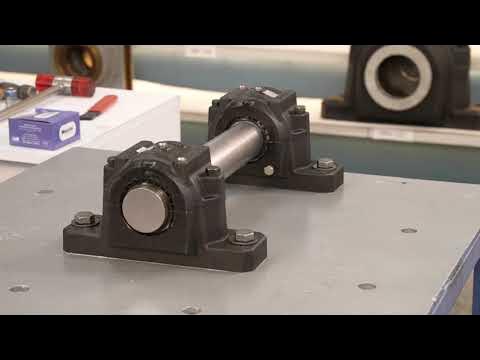Uncovering the Secrets of Bearing Failure: A Comprehensive Analysis
Summary
TLDRThis video discusses the reasons behind bearing failures in equipment, emphasizing the critical role of proper lubrication and the dangers of both insufficient and excessive lubrication. It outlines various failure causes, including contamination, internal clearance issues, overheating, misalignment, and corrosion. The video highlights the consequences of bearing failures, such as equipment breakdowns and potential hazards to workers. By understanding these factors, viewers can better maintain their equipment and prevent costly downtime, ensuring smoother operations in industrial settings.
Takeaways
- 😀 Proper bearing function is crucial for equipment efficiency and process continuity.
- 😀 Bearing failures can lead to equipment breakdowns and affect production negatively.
- 😀 Common cause of bearing failure is lack of lubrication, leading to metal-to-metal contact.
- 😀 Excess lubrication can also cause failures by increasing energy loss and temperature.
- 😀 Contaminants in lubricants, such as water or foreign particles, can damage bearings.
- 😀 Incorrect internal clearance can lead to overheating and premature bearing failure.
- 😀 Overloading bearings consistently can result in overheating and rapid wear.
- 😀 Misalignment during installation can compromise bearing integrity and performance.
- 😀 Corrosion due to moisture and temperature fluctuations can shorten bearing lifespan.
- 😀 Electrical damage from alternating currents can lead to visible surface degradation on bearings.
Q & A
What is the main topic discussed in the video?
-The video discusses the reasons behind bearing failures and the potential causes of these failures in equipment.
What happens when a bearing fails in an equipment?
-Bearing failure can lead to equipment breakdown, halting processes, and potentially causing serious injuries to workers.
What is one of the most common causes of bearing failure?
-A lack of lubrication is one of the most common causes of bearing failure.
Can too much lubrication also cause bearing failure?
-Yes, excessive lubrication can lead to energy loss and increased temperature, which may contribute to bearing failure.
What impact does contamination have on bearings?
-Contamination from foreign particles or chemicals can damage the lubricating film and lead to bearing failure.
How does internal clearance affect bearing performance?
-Improper internal clearance can lead to excessive friction and overheating, resulting in premature bearing failure.
What are the consequences of overheating in bearings?
-Overheating can melt the lubricant, cause material softening, and ultimately lead to bearing failure.
What is misalignment and how does it affect bearings?
-Misalignment occurs when bearings are not installed correctly, leading to increased wear and a higher risk of failure.
What role does corrosion play in bearing failures?
-Corrosion can result from moisture or temperature fluctuations, damaging the surface and shortening bearing life.
How does electrical damage affect bearings?
-Electrical damage, from constant or alternating currents, can create brown discoloration on the bearing surface, leading to failure.
Outlines

This section is available to paid users only. Please upgrade to access this part.
Upgrade NowMindmap

This section is available to paid users only. Please upgrade to access this part.
Upgrade NowKeywords

This section is available to paid users only. Please upgrade to access this part.
Upgrade NowHighlights

This section is available to paid users only. Please upgrade to access this part.
Upgrade NowTranscripts

This section is available to paid users only. Please upgrade to access this part.
Upgrade NowBrowse More Related Video
5.0 / 5 (0 votes)





